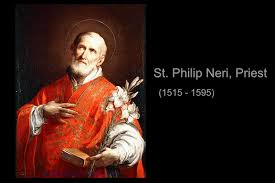We celebrate today one of the most joyful and idiosyncratic – the two are not unrelated – of saints, Philip Neri, (+1595), the founder of the Congregation of the Oratory named after him. From the great city of Florence, which has produced a whole host of luminaries from Dante to da Vinci to Galileo, Philip as a young man made his way to Rome (the city of which he was called the ‘second Apostle’), where he lived sort of as a tutoring hermit, devoted to prayer – his winning personality and charisma evinced the great joy that should be a hallmark of our Faith, and he led many souls to God.
His confessor more or less ordered him to become a priest, and, sure enough, other priests gathered around him. They lived in community, praying, administering the sacraments, preaching, fostering beautiful liturgy and music – Palestrina was a spiritual disciple of Saint Philp. What we now know as the ‘Oratory’ grew around Father Philip, now with houses now throughout the world. John Henry Newman joined the Oratory when he converted to Catholicism, who brought it to England, whence it came to Canada and America.
Philip was known for his perennially youthful, exuberant spirit, the antithesis of the sadness, depression and ennui – in all of which the Devil rejoices – that so palls our modern world, not least in these Covidian days. As he used to quip, ‘I’ll have no sad saints in my house!’ In the Catholic faith, even our sorrow is tinged always with joy – for as Saint Paul says, what can they – and we all know who ‘they’ are – do to us? We’re on our way to heaven, and being martyred – upon which Saint Philip recommended we meditate often – is simply a shortcut thereto.
After death, his heart was physically twice its normal size, so filled was he with the love of God. The house of the Oratory was open to one and all, and when his fellow priests complained about the rambunctious young people making too much noise, Philip would reply that ‘he would have them chop wood on my back, if it would keep them from sin’.
Father Philip was a saint of the ‘counter-Reformation’ more properly called the Catholic restoration, a much-needed antidote to the gloominess and grimness of the Calvinism and Jansenism leading souls to despair, the answer to which is not a hedonistic paganism – itself a subtle form of despair – but Christ’s true message of hope and salvation.
Catholics should be known for their cheerfulness and happiness, even if we carry some, or many, sorrows. For beneath the surface turbulence, at a deeper level, we should have that peace and joy that transcends understanding. In living out God’s will there is light, and the Light, at the end of the tunnel, however long and dark it may seem.
Pope John Paul’s message to youth (and his spirit resembled Saint Philip’s in many ways) was to cast into the deep and be not afraid, be who you are meant to be. God always loves you and wants to bring you higher – Pier Giorgio! – to Himself. The only way we can be truly sad is to live apart from Him, our Creator, our Redeemer, our Sanctifier, in Whom delights know no end.
The best way to fight acedia and sadness, the Fathers taught, was to give God that initial ‘yes’, an act of the will that at first may seem difficult, but, once given, we find that His yoke really is easy, and burden light. As Saint Thomas put it, even great and difficult works, if done with love, seem insignificant, and we will always want to do more, with that joy and zeal that should be the hallmarks of sanctity, to which we are all called.
Philip lived that message until his 79th year, when he died peacefully after leading untold numbers of souls to God. He was one of the most remarkable of confessors, able to read hearts, and leading his penitents to see the true evil of sin, and the true goodness of virtue. He had all his writing and letters burned, but his spirit, his sayings, maxims, counsel, but most of his example, will live on through the ages, until the end of time.
So rejoice and be glad, for our salvation is always near at hand.
Saint Philip Neri, ora pro nobis!










